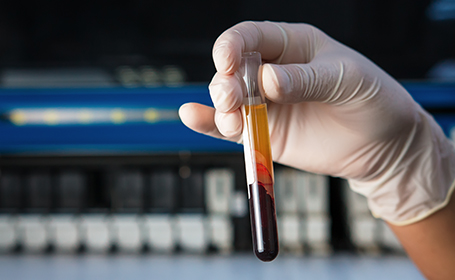
Blood cancer symptoms you shouldn't ignore
Consultant Haemato-Oncologist Dr Premini Mahendra from The Priory Hospital discusses the different types of blood cancer and their symptoms
The symptoms of blood cancer can be hard to recognise as they may appear slowly or not at all. However, being aware of the signs and symptoms is really important.
Symptoms of leukaemia
 Leukaemia is a type of blood cancer that affects your bone marrow and the bone marrow's ability to make normal blood cells.
Leukaemia is a type of blood cancer that affects your bone marrow and the bone marrow's ability to make normal blood cells.
Symptoms of leukaemia usually include:
- Tiredness and worsening fatigue: This can occur when a large number of leukaemia cells cause the blood to become too thick. This slows down the circulation through blood vessels in the brain
- Looking pale: The skin may appear unusually pale in those with leukaemia
- Shortness of breath: People with leukaemia may find that there are short of breath after very little activity
- Infections: Recurring infections can occur due to a shortage of normal white blood cells
- Bleeding: People with leukaemia may experience bleeding from their gums, nose or in their stools
- Bruising: Bruises may appear easily after even very small bumps
All of these symptoms are common, but there can be other reasons for these symptoms apart from leukaemia. If you do experience these symptoms, it’s really important to go and see your doctor.
How is leukaemia diagnosed?
To make a diagnosis of leukaemia your doctor will typically perform a simple blood test, called a full blood count.
To confirm the diagnosis, the doctor would need to take a sample of bone marrow. This is usually taken from your pelvis during a procedure called a bone marrow biopsy.
Lymphoma is a cancer that affects your lymphatic system. This includes the lymph nodes, bone marrow and spleen.

Symptoms of lymphoma
Lymphoma is a cancer that affects your lymphatic system. This includes the lymph nodes, bone marrow and spleen. However, many organs include lymphoid tissue so it can virtually affect any organ in the body including the gut, skin and brain.
This type of cancer is split into two types – Hodgkin and non-Hodgkin lymphoma. The two types look different under the microscope because the Hodgkin lymphoma contains very large cells named Reed-Sternberg cells. Although these cancers are classified and treated differently, they have very similar symptoms.
Lymphoma symptoms can include:
- Enlarged lymph glands in the neck, armpit or groin: These swellings usually appear as painless lumps in the armpit, groin or neck. They are caused by extra lymphocytes being produced by the glands. This will often be the first thing people will notice from the list of symptoms
- Fevers or sweats: People who have night sweats related to lymphoma typically find that they persistently wake up in the night drenched in sweat. They may have to change their clothes and their bed sheets
- Weight loss: Losing weight very quickly and without a change in diet or exercise routine can be a sign of lymphoma
- Itching: Also known as pruritus, this symptom is when the body feels itchy all over without showing signs of a rash
- Shortness of breath: Some people suffer with a persistent cough and feel breathless as a result of lymphoma
- Swelling of the tummy: If the swollen lymph nodes are located in the abdomen they can cause discomfort, pain and indigestion
- Fatigue: Generally feeling exhausted after very little activity can be an indicator of lymphoma
As mentioned before, these symptoms can be due to many other reasons; however it’s always a good idea to see your doctor to identify the cause of your symptoms.

How is lymphoma diagnosed?
To make a diagnosis of lymphoma your doctor may do the following:
- Blood tests
- A lymph node biopsy
- A PET or CT scan
- A bone marrow biopsy
Symptoms of myeloma
Myeloma is a type of bone marrow cancer that affects cells called plasma cells. This type of cancer occurs when bone marrow produces too many plasma cells, which leaves little room for the other important types of blood cells to grow.
Myeloma symptoms can include:
- Bone pain: Usually affecting the spine or long bones such as the arms or legs. This feels like an aching or dull and persistent pain
- Kidney failure: When abnormal proteins and extra calcium are produced, they can damage the kidneys. Symptoms such as swollen ankles, weight loss and tiredness can occur as a result of the kidney damage
- Repeated infections: Some people will find that they experience recurring infections which can be a sign a myeloma
- Unusual bleeding: Particularly heavy bleeding and frequent nose bleeds could indicate that the body is unable to produce platelets (the cells used to clot the blood) because of the extra plasma cells
- Numbness: If a fracture occurs in the spine it can lead to compression: a collapse of the structure of the spinal cord. This symptom can make patients feel numb in certain areas of their body such as legs and feet, and can also lead to reduced control over the bladder and bowel
Again, these symptoms can present for a number of reasons, so make sure not to put off visiting your GP.
Blood cancer accounts for 3% of all cancer deaths in UK. In fact, it claims the lives of 4,600 people each year; so it's vital to be aware of the signs and symptoms.
How is myeloma diagnosed?
Myeloma is typically more difficult to spot as it doesn’t always cause any symptoms in its early stages. Many cases of myeloma that are identified in the early stages are picked up during a routine blood or urine test.
To make a diagnosis of myeloma your doctor will do the following:
- Blood tests to include full blood count, kidney function, calcium, serum electrophoresis and serum free light chains
- Bone marrow biopsy
- CT, MRI or PET scan
Blood cancer accounts for 3% of all cancer deaths in the UK. In fact, it claims the lives of 4,600 people each year; so it's vital to be aware of the signs and symptoms.
If you have any concerns, please make sure to talk to your doctor.

Tags
How do I book an appointment?
If you're concerned about symptoms you're experiencing or require further information on this subject, talk to a GP or see an expert consultant at your local Circle Hospital.